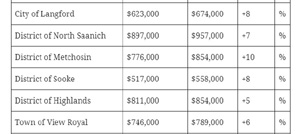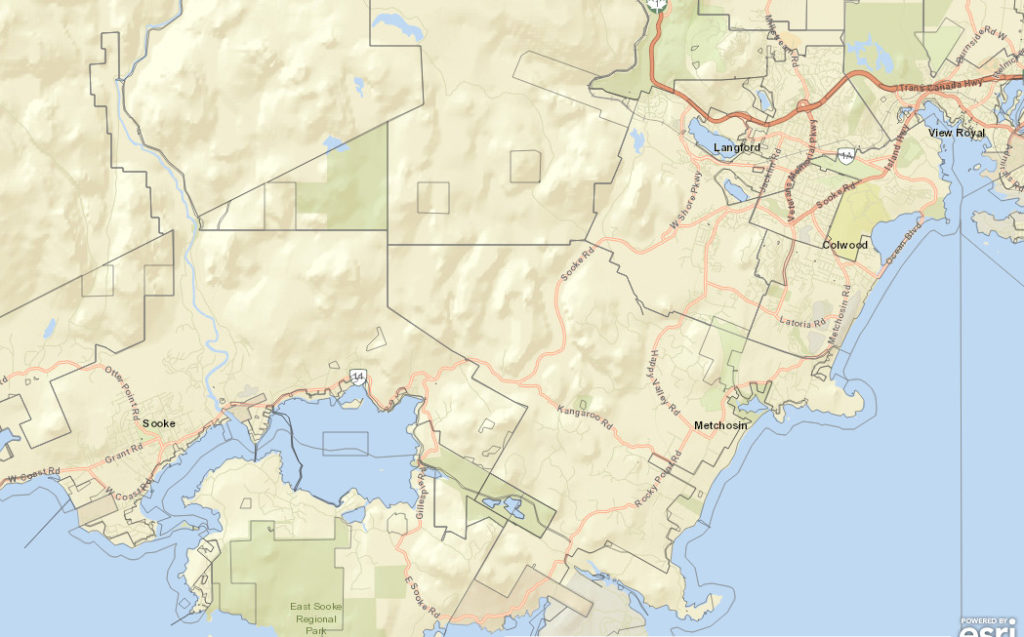
Monday January 4, 2021 | VANCOUVER ISLAND, BC
by Mary P Brooke, editor | Island Social Trends
As regularly as the new year comes, so do the year’s annual property assessments in BC.
In the next few days, owners of about 378,000 properties throughout Vancouver Island can expect to receive their 2021 assessment notices, which reflect market value as of July 1, 2020.
Changes in property assessments reflect movement in the local real estate market and can vary greatly from property to property.
“Home values across Vancouver Island have appreciated this year due to strong demand combined with limited inventory for sale,” says Vancouver Island Assessor Tina Ireland. “For most communities, the assessed values of single family homes are up moderately about five to ten per cent, while residential stratas are generally showing less of an increase.”
BC Assessment collects, monitors and analyzes property data throughout the year. In BC, approximately 88% of all properties are classified with some residential (Class 1) component. This equates to about $1.5 trillion of the value on the total provincial roll.
Determining value, where the money goes:
Real estate sales determine a property’s value which is reported annually by BC Assessment. BC Assessment’s assessment roll provides the foundation for local and provincial taxing authorities to raise billions of dollars in property taxes each year. Through the province, this revenue funds the many community services provided by local governments around the province as well as government programs and the K-12 public education system.
Most property values have increased:
The table below (as provided by BC Assessment) indicates British Columbia’s estimated range of percentage changes to 2021 assessment values for residential properties compared to 2020. Property assessments may vary by jurisdiction or municipality across the province:
| Property Type | British Columbia: Province-wide 2021 Assessments Range of % Changes in Value for the Majority of Residential Properties (as of July 1, 2020) |
| Residential Single Family Homes | 0% to +10% |
| Residential Strata Homes (e.g. condos/townhouses) | 0% to +10% |
Overall, Vancouver Island’s total assessments increased by about $14 billion in the pandemic year that was 2020 — from about $255 billion in 2020 to $269 billion. Over $3.47 billion of the region’s updated assessments is from new construction, subdivisions and rezoning of properties.
BC Assessment’s Vancouver Island region includes all communities located within Greater Victoria, South Island, Central Island, North Island, West Coast, Northern and Southern Gulf Islands and Powell River.
Growth for single family home values was seen pretty much across the board on Vancouver Island. The lowest percentage growth was in Parksville and Sayward; negative growth was seen only in Port McNeil.

The summaries below provide estimates of typical 2020 versus 2021 assessed values of properties throughout the region. In the west shore region in 2020, the overall estimated property value of single family homes went up by $78,000 in Metchosin, $54,000 in Colwood, $51,000 in Langford, $43,000 in View Royal, $43,000 in Highlands, and $41,000 in Sooke.
Examples by Geographic Area:
These examples demonstrate market trends for single-family residential properties by geographic area (* all data calculated based on median values):
| Single Family Homes by Community | 2020 Typical Assessed Value as of July 1, 2019 | 2021 Typical Assessed Value as of July 1, 2020 | % Change | |
| Greater Victoria | ||||
| City of Colwood | $631,000 | $685,000 | +9 | % |
| City of Victoria | $820,000 | $868,000 | +6 | % |
| District of Central Saanich | $739,000 | $774,000 | +5 | % |
| Township of Esquimalt | $702,000 | $758,000 | +8 | % |
| District of Saanich | $813,000 | $849,000 | +4 | % |
| District of Oak Bay | $1,144,000 | $1,228,000 | +7 | % |
| City of Langford | $623,000 | $674,000 | +8 | % |
| District of North Saanich | $897,000 | $957,000 | +7 | % |
| District of Metchosin | $776,000 | $854,000 | +10 | % |
| District of Sooke | $517,000 | $558,000 | +8 | % |
| District of Highlands | $811,000 | $854,000 | +5 | % |
| Town of View Royal | $746,000 | $789,000 | +6 | % |
| Town of Sidney | $691,000 | $729,000 | +6 | % |
| Gulf Islands | $547,000 | $585,000 | +7 | % |
| Central Island | ||||
| Town of Ladysmith | $445,000 | $476,000 | +7 | % |
| Town of Lake Cowichan | $340,000 | $368,000 | +8 | % |
| City of Duncan | $370,000 | $388,000 | +5 | % |
| District of North Cowichan | $459,000 | $489,000 | +7 | % |
| District of Lantzville | $608,000 | $640,000 | +5 | % |
| City of Nanaimo | $504,000 | $527,000 | +5 | % |
| Nanaimo Rural | $461,000 | $502,000 | +9 | % |
| Town of Qualicum Beach | $596,000 | $632,000 | +6 | % |
| City of Parksville | $488,000 | $505,000 | +3 | % |
| District of Tofino | $877,000 | $956,000 | +9 | % |
| Town of Ucluelet | $447,000 | $496,000 | +11 | % |
| City of Port Alberni | $299,000 | $320,000 | +7 | % |
| North Island | ||||
| City of Courtenay | $456,000 | $488,000 | +7 | % |
| Town of Comox | $526,000 | $555,000 | +6 | % |
| Village of Cumberland | $493,000 | $524,000 | +6 | % |
| City of Campbell River | $441,000 | $464,000 | +5 | % |
| Campbell River Rural | $402,000 | $421,000 | +5 | % |
| District of Port Hardy | $195,000 | $214,000 | +10 | % |
| Village of Port Alice | $136,000 | $153,000 | +12 | % |
| Town of Port McNeil | $230,000 | $229,000 | 0 | % |
| Village of Gold River | $182,000 | $212,000 | +17 | % |
| Village of Tahsis | $99,000 | $135,000 | +36 | % |
| Village of Alert Bay | $149,000 | $164,000 | +10 | % |
| Village of Sayward | $234,000 | $240,000 | +3 | % |
| Village of Zeballos | $59,000 | $69,000 | +18 | % |
| Port Hardy | $195,000 | $214,000 | +10 | % |
| Powell River | ||||
| Powell River Regional District – Rural Areas | $277,000 | $301,000 | +9 | % |
| City of Powell River | $337,000 | $368,000 | +9 | % |
These examples demonstrate market trends for strata residential properties (e.g. condos/townhouses) by geographic urban area for select urban communities:*
| Strata Homes (Condos/Townhouses) by Community | 2020 Typical Assessed Value as of July 1, 2020 | 2021 Typical Assessed Value as of July 1, 2021 | % Change | |
| Various Urban Areas: | ||||
| City of Victoria | $449,000 | $459,000 | +2 | % |
| City of Colwood | $415,000 | $432,000 | +4 | % |
| District of Central Saanich | $500,000 | $495,000 | +1 | % |
| Township of Esquimalt | $394,000 | $414,000 | +5 | % |
| District of Saanich | $450,000 | $451,000 | 0 | % |
| District of Oak Bay | $635,000 | $649,000 | +2 | % |
| City of Langford | $399,000 | $413,000 | +4 | % |
| Town of View Royal | $473,000 | $487,000 | +3 | % |
| Town of Sidney | $465,000 | $475,000 | +2 | % |
| City of Nanaimo | $314,000 | $324,000 | +3 | % |
| City of Courtenay | $307,000 | $319,000 | +4 | % |
| City of Campbell River | $265,000 | $285,000 | +8 | % |
*All data calculated based on median values.
BC Assessment website:
BC Assessment’s website at bcassessment.ca includes more details about 2021 assessments, property information and trends such as lists of 2021’s top valued residential properties across the province.
The website also provides self-service access to a free, online property assessment search service that allows anyone to search, check and compare 2021 property assessments for anywhere in the province. Property owners can unlock additional property search features by registering for a free BC Assessment custom account to check a property’s 10-year value history, store/access favourites, create comparisons, monitor neighbourhood sales, and use our interactive map.
“Property owners can find a lot of valuable information on our website including answers to many assessment-related questions, but those who feel that their property assessment does not reflect market value as of July 1, 2020 or see incorrect information on their notice, should contact BC Assessment as indicated on their notice as soon as possible in January,” says Assessor Tina Ireland.
“If a property owner is still concerned about their assessment after speaking to one of our appraisers, they may submit a Notice of Complaint (Appeal) by February 1st, for an independent review by a Property Assessment Review Panel,” adds Ireland.
The Property Assessment Review Panels, independent of BC Assessment, are appointed annually by the provincial government, and typically meet between February 1 and March 15 to hear formal complaints.
“It is important to understand that changes in property assessments do not automatically translate into a corresponding change in property taxes,” explains Ireland. “As indicated on your Assessment Notice, how your assessment changes relative to the average change in your community is what may affect your property taxes.”
Have questions?
Property owners can contact BC Assessment toll-free at 1-866-valueBC (1-866-825-8322) or online at bcassessment.ca. During the month of January, hours of operation are 8:30 a.m. to 5:00 p.m., Monday to Friday.
Follow BC Assessment on Twitter, YouTube, Facebook, and LinkedIn.




